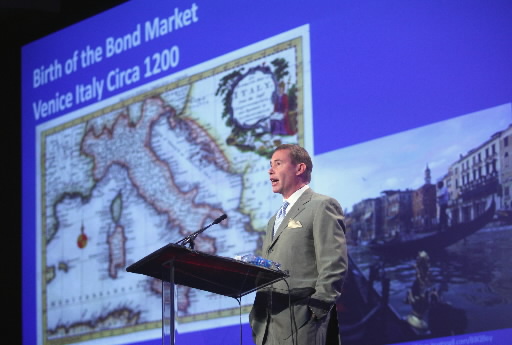Out-of-control debt will force massive policy changes, including tax hikes and spending cuts; 'we're going to jump the tracks'
Jeffrey Gundlach, the star fund manager of Doubleline Capital LP, offered up his investment strategy for attendees of the Investment Management Consultants Association national conference Tuesday.
“I would go long natural gas and short Apple [stock] and leverage it 100 times,” Mr. Gundlach said in an unrelentingly pessimistic address to open the second day of the IMCA conference in National Harbor, Md.
The former bond fund manager at TCW Group Inc. who launched Doubleline after being fired by TCW in 2009 was speaking on the “global debt crisis” — and shocked his early morning audience.
“We have a culture of cowardice at Doubleline," said Mr. Gundlach. "We're scared to death of everything.”
The reason? The morass of global debt that has accumulated over the last 30 years. Mr. Gundlach has little confidence that politicians will be able to do much more than postpone the day of reckoning. That means more borrowing and further stimulus efforts to prop up moribund economies.
“When he was vice president, Dick Cheney said that deficits don't matter — Ronald Reagan taught us that,” he said. “It's symptomatic of the embrace of a ludicrous idea.”
Mr. Gundlach, who came armed with dozens of charts and graphs depicting the severity of the situation, said he had little faith that indebted countries would have the will to do anything about it. “Everybody wants change, but no one wants to be the one to change,” he said. “I wish the global debt problem would go away, too. But if you cover your ears, it doesn't mean it will.”
Mr. Gundlach suggested that the growing opposition to austerity measures bode ill for eurozone economies, with Spain's being the most worrisome. Japan's bad demographic profile is ominous, he said. Whether it was tsunami-induced, the country's continuing trade deficit and depleted savings pool suggest more difficulties there.
The U.S. is scarcely better off. Median real incomes have been flat for several decades, while the household share of the national debt has increased from roughly $20,000 to $84,000. Labor participation rates are falling for every age group other than those over 55. Government spending on defense, health care and social security has exploded.
Mr. Gundlach also pointed out the “coincidence” of the explosion of debt in the U.S. since 1980 and the widening wealth discrepancy.
“I see problems between the haves and have nots in the U.S.,” he said, noting that the top 1% of Americans' share of national wealth increased from 8.9% in 1976 to 23.5% in 2007. “This may be oversimplifying it, but it looks like the U.S. borrowed a whole lot of money and gave it to rich people.”
Mr. Gundlach said he was in favor of the so-called Buffett rule and suggested that the 13% effective income tax rate paid by Republican presidential candidate Mitt Romney's will be a problem for him in the coming election.
Mr. Gundlach derided Treasury Secretary Timothy Geithner's recent suggestion that the success of the next phase of crisis response depended on Europe's willingness to employ the tools and resources at its disposal. “What are the tools and resources he's talking about?” he said. “How do you shore up a debt problem with more debt?”
The solutions will be unavoidably painful. “Massive policy changes are coming in this country. There will be tax increases and spending cuts,” he said.
What should investors do? “The bottom line is that investors can't have a long-term horizon anymore unless you plan on buying land for your great-great- grandchildren,” Mr. Gundlach said.
His only major advice to U.S. investors is to diversify with more alternatives, real assets and international exposure and get used to the volatility.
“Investors will continue to bounce from despair to euphoria,” he said. “Things can go on for longer than you think, but we're going to jump the track.”







